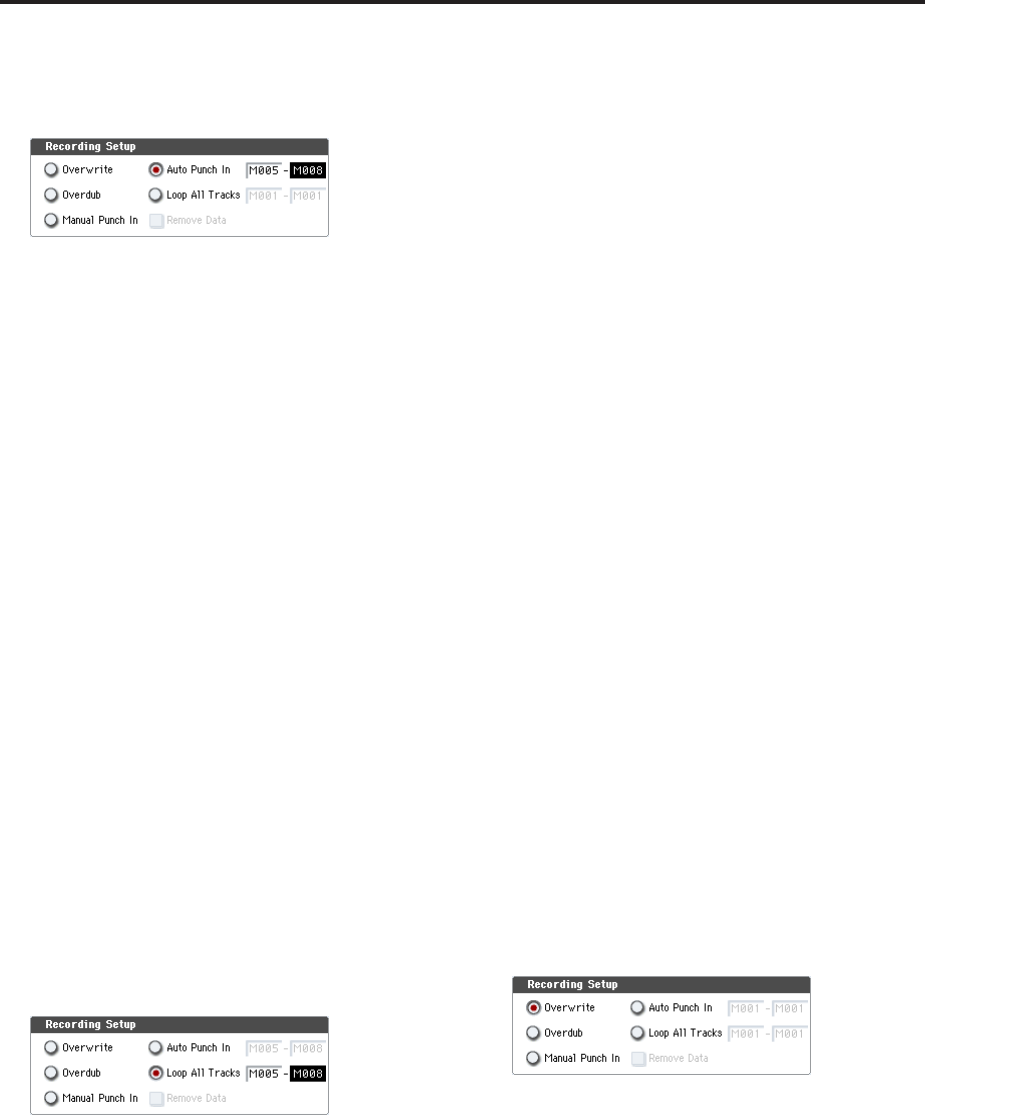
MIDI recording Recording MIDI in real-time
87
1. Use “Track Select” to select the track that you want
to record.
2. Set the Recording Setup to Auto Punch In.
3. In “M (Auto Punch In Start Measure), “M (Auto
Punch In End Measure)” specify the area that you
wish to record.
For example if you specify M005–M008, recording
will occur only from measure 5 to measure 8.
4. In “Location,” specify a location several measures
earlier than the point at which you wish to begin
recording.
5. Press the SEQUENCER REC/WRITE switch, and
then press the SEQUENCER START/STOP switch.
Playback will begin.
When you reach the starting location you specified
in step 3, recording will begin. Play the keyboard
and operate controllers such as the joystick to record
your performance. When you reach the ending
location you specified in step 3, recording will end.
(Playback will continue.)
6. Press the SEQUENCER START/STOP switch.
Playback will stop, and you will return to the
location you specified in step 4.
Loop All Tracks
This method lets you continue recording as you add
musical data.
The specified region can be recorded repeatedly. This is
ideal when recording drum phrases, etc.
1. Use “Track Select” to select the track that you want
to record.
2. Set the Recording Setup to Loop All Tracks.
If Multi REC is checked, it will not be possible to
select Loop All Tracks.
3. In “M (Loop Start Measure), “M (Loop End
Measure)” specify the area that you wish to record.
For example if you specify M004–M008, recording
will occur repeatedly (as a loop) from measure 4 to
measure 8.
4. In “Location,” specify a location several measures
earlier than the point at which you wish to begin
recording.
5. Press the SEQUENCER REC/WRITE switch, and
then press the SEQUENCER START/STOP switch.
Playback will begin. When you reach the starting
location you specified in step 3, recording will
begin. Play the keyboard and operate controllers
such as the joystick to record your performance.
When you reach the ending location you specified
in step 3, you will return to the starting location,
and continue recording.
The musical data that is loop-recorded will be
added to the previously-recorded data.
6. You can also erase specific data even while you
continue loop recording.
If you press the SEQUENCER REC/WRITE switch
during loop recording, all musical will be removed
from the currently selected track as long as you
continue pressing the switch.
By checking the “Remove Data” check box you can
erase only the specified data. During loop
recording, press the note that you wish to delete,
and only the data of that note number will be
deleted from the keyboard as long as you continue
pressing that note.
Similarly, bender data will be deleted as long as you
tilt the joystick in the X (horizontal) direction, and
after touch data will be deleted as long as you apply
pressure to the keyboard.
When you are once again ready to record musical
data, uncheck the “Remove Data” check box.
7. Press the SEQUENCER START/STOP switch.
Playback will end, and you will return to the
recording start location that you specified in step 4.
If Loop All Tracks is selected, normal playback will
be looped as well.
Multi (multitrack recording)
Multitrack recording allows you to simultaneously
record onto multiple tracks, each with a different
channel.
1. In the upper right of the LCD screen, check “Multi
REC.”
2. Make the desired Recording Setup settings.
You can record using Overwrite, Overdub, Manual
Punch In, or Auto Punch In.
3. Use “Location” to specify the measure at which
recording will begin.
4. Press the SEQUENCER REC/WRITE switch.
5. For the track you want to record, press
Play/Rec/Mute to make it indicate Rec.
6. Press the SEQUENCER START/STOP switch.
With the default settings for Metronome Setup, the
metronome will sound for a two-measure pre-
count, and then recording will begin. Now you can
perform on the keyboard and controllers, and use
the KARMA or RPPR functions if desired.
7. Press the SEQUENCER START/STOP switch.
Playback will stop, and you will return to the
location specified in step 4.
